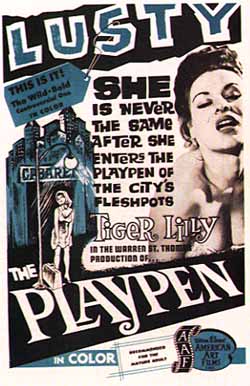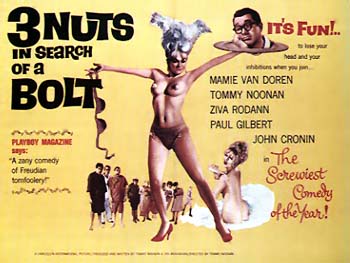|
 Images: As the sixties wore on, movies such as The Defilers and The Debauchers appeared. Now we're talking about the roughies, the kinkies, and the ghoulies. How did we get from the nudie cuties to these more violent movies? Images: As the sixties wore on, movies such as The Defilers and The Debauchers appeared. Now we're talking about the roughies, the kinkies, and the ghoulies. How did we get from the nudie cuties to these more violent movies?
Eddie Muller: I call roughies the demon brother of the nudie cutie. It's the complete opposite. I mean these films were really mean spirited. They were about the worst, basest human emotions. The premise of all of them was that women are abused in these movies. Why that was and how that became a viable entertainment in the grindhouse--part of it was, I think, the sixties were such a turbulent time--violence begets violence. I think that was just a reflection of the times on the one hand. On the other hand, I know for a fact that a big part of it was just the pressure on the producers and exhibitors to come up with something new constantly. Because by the early 1960s, television was really competing with the movie business. The movie business had never been so bad as it was then. And so to get people to leave their houses and go pay money to see something you had to give them something they hadn't seen before. And in the case of the roughies and kinkies and those films, once the nudie cutie had established that you could see naked women, the only thing left to do was to actually do something. In the nudie cuties, like the nudist camp movies, there was no sexual contact. It was all voyeurism, all just looking and leering. But with the roughies, it was "Now we know we can see these women undress and now we have to do something," and sadly what they did was they beat the women--because it was strictly against the law to show people having sex. If you want to find the strangest think in the whole book, ergo our whole society, what they were allowed to do was beat and abuse the women. They could not make love to the women, but they could whack them around.
Images: Did any of the producers and exhibitors of roughies and kinkies run into legal problems for these movies?
Eddie Muller: Nobody said a word. There were movies that were, of course, deemed to be in bad taste. David Friedman and Herschell Gordon Lewis were two of the guys who kind of kicked this whole genre off. They did it not with a roughie, but with a ghoulie, a film called Blood Feast. And specifically their attitude was "Okay, we've done the nudie cuties. We've done the nudist camp movies. What can we do next?" And they knew they couldn't show people having sex, but there was nothing about knives and axes. So they got Connie Mason, who was a Playboy centerfold, and they went down to Florida and they made this movie about a crazy Egyptian caterer who sacrifices people to Ramses or whoever and they hacked these women up. It's really a big old slaughterhouse of a movie. It's easy for me to understand why people are aghast at this stuff. But Dave Friedman, whom I know, to him it's just a lark.
Images: In terms of hucksterism?
Eddie Muller: Exactly. Friedman showed the film in Sarasota, Florida prior to its actual commercial run and took out an injunction barring the film from being screened. He took it out himself and once they granted the injunction he leaked the story to the press. And said they won't allow the film to be shown. It generated all kinds of publicity on his behalf. He had air sickness masks emblazoned with "You'll need this if you see Blood Feast" and he distributed them in the movie theaters. Fool proof. And he has the last laugh because he knows the people who rail against him are bringing him more business. He sees it all as a scam. He's putting one over on people and it's tremendous fun. And people who take it seriously and get up in arms are just playing right into his hands.
|

Mamie Van Doren eagerly shed her clothing in sixties sex comedies, such as 3 Nuts in Search of a Bolt (1963).
|
Images: Are there any filmmakers from this period, other than Russ Meyer (Faster Pussycat! Kill! Kill!), that you would recommend?
Eddie Muller: I think some of the early stuff by Radley Metzger was really good. I rave a little bit about a film he made called Therese and Isabelle, which is a great picture. He has one of longest and most interesting careers of the "Adults Only" filmmakers. He started out as an editor working to censor movies. He was the guy who cut out the perceived nasty parts in some of the earliest foreign films, controversial films such as Bitter Rice. Very young then, before he went off to the Korean War. And then he supervised the Americanized version of And God Created Woman, the Bardot film--which was really one of the critical films in terms of bringing the battle of what was allowable on screen. And then he got into film distribution and imported a lot of foreign films into this country. He really was the point man for bringing more sexually explicit and intelligent foreign films to the American market.
Images: In the seventies, he would assume the name Henry Paris as he moved into explicit sex movies, such as The Opening of Misty Beethoven. What was this period like in the infancy of hardcore cinema? I've heard about long lines of people waiting to get into see Deep Throat and couples going to XXX rated movies. Was this really happening?
Eddie Muller: It happened. It was a dare to be hip period. The early seventies were pretty amazing. The Vietnam War was winding down and people on the home front felt we were kind of responsible for ending that war. For better or worse, there was a permissiveness, an extremely liberal attitude. And this was one of the ways it manifested itself. Now in the age of AIDS, of course, it is astounding to look back and see they were advertising a promiscuous life style. And the movies reflected that. Sure, people went on dates to see Deep Throat, and it absolutely astounds me. I think "who takes their dates to see this movie?" I guess the answer to that is Travis Bickle in Taxi Driver. Travis takes Cybill Shepherd to see some Swedish sex film. And actually Taxi Driver catches the grindhouse experience perfectly. That was right in that period when those movies had bridged the gap between the grindhouse and the legitimate theater. He takes Cybill Shepherd to, I think, the Lyric in New York. It's a legitimate house and they're showing some bizarre Swedish sex education movie or something. And she's humiliated of course. And then there's the scene in the movie where Travis goes for the more down-and-dirty hardcore thing. He's sitting in the movie theater and it's awful. He tries to make conversation with the woman at the candy counter. It's grungy and awful.
Images: In the wake of the video cassette recorder explosion of the seventies and eighties, the grindhouse is now largely history. Are you mourning the death of the grindhouse in any way?
Eddie Muller: No. I have to be honest and say I'm not really mourning it. I will say I'm fascinated by it. As I'm fascinated by any phenomenon where you can see the beginning, you can follow its development, and then you can see its end. And you can see the reasons why it began, the reasons why it grew, and the reasons why it diminished. For me that's fascinating, that you can actually trace that. And now of course, there's a whole other chapter being written. I think what this book points out is you can now follow the same pattern of development on a parallel track because the story remains the same; the delivery mechanism changes. Then it becomes the VCR and out of the VCR comes the personal computer, and then you're going online, and amazingly what you're getting, the content, the reason for the existence of that content doesn't change. People want to see something that they're not supposed to see or that they've been told is off limits. People will say, "My God, we have to crack down on this." And other people will say "Whoa. If everybody wants to crack down on it there must be some way we can make a buck." So that's really my bottom line with this book.
page 3 of 3

Photo credits: All photos are courtesy of the collections of Eddie Muller and Daniel Faris.
|